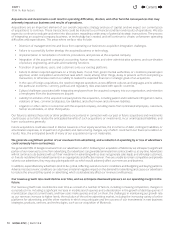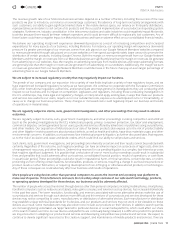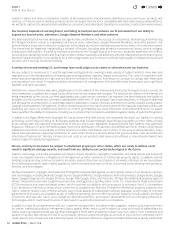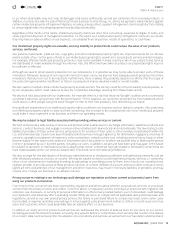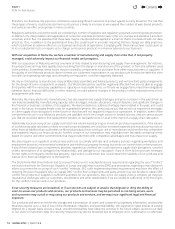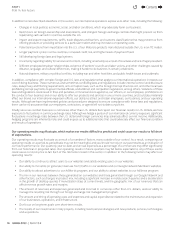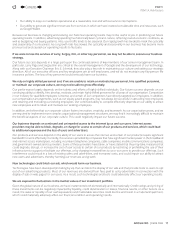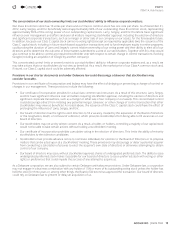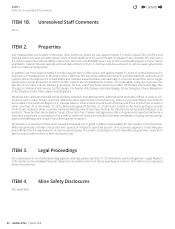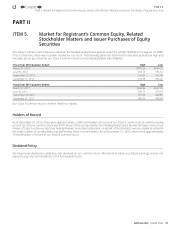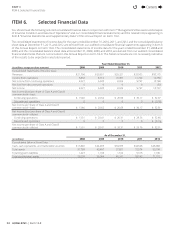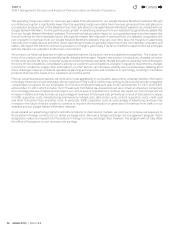Google 2012 Annual Report Download - page 23
Download and view the complete annual report
Please find page 23 of the 2012 Google annual report below. You can navigate through the pages in the report by either clicking on the pages listed below, or by using the keyword search tool below to find specific information within the annual report.
17GOOGLE INC. | Form10-K
PART I
ITEM1A.Risk Factors
•Our ability to keep our websites operational at a reasonable cost and without service interruptions.
•
Our ability to generate signifi cant revenues from services in which we have invested considerable time and resources, such
as Google Wallet.
Because our business is changing and evolving, our historical operating results may not be useful to you in predicting our future
operating results. In addition, advertising spending has historically been cyclical in nature, refl ecting overall economic conditions, as
well as budgeting and buying patterns. Also, user tra c tends to be seasonal. Our rapid growth has tended to mask the cyclicality
and seasonality of our business. As our growth rate has slowed, the cyclicality and seasonality in our business has become more
pronounced and caused our operating results to fl uctuate.
If we were to lose the services of Larry, Sergey, Eric, or other key personnel, we may not be able to execute our business
strategy.
Our future success depends in a large part upon the continued service of key members of our senior management team. In
particular, Larry Page and Sergey Brin are critical to the overall management of Google and the development of our technology.
Along with our Executive Chairman Eric E. Schmidt, they also play a key role in maintaining our culture and setting our strategic
direction. All of our executive o cers and key employees are at-will employees, and we do not maintain any key-person life
insurance policies. The loss of key personnel could seriously harm our business.
We rely on highly skilled personnel and, if we are unable to retain or motivate key personnel, hire qualifi ed personnel,
or maintain our corporate culture, we may not be able to grow eff ectively.
Our performance largely depends on the talents and eff orts of highly skilled individuals. Our future success depends on our
continuing ability to identify, hire, develop, motivate, and retain highly skilled personnel for all areas of our organization. Competition
in our industry for qualifi ed employees is intense, and certain of our competitors have directly targeted our employees. In addition,
our compensation arrangements, such as our equity award programs, may not always be successful in attracting new employees
and retaining and motivating our existing employees. Our continued ability to compete eff ectively depends on our ability to attract
new employees and to retain and motivate our existing employees.
In addition, we believe that our corporate culture fosters innovation, creativity, and teamwork. As our organization grows, and we
are required to implement more complex organizational management structures, we may fi nd it increasingly di cult to maintain
the benefi cial aspects of our corporate culture. This could negatively impact our future success.
Our business depends on continued and unimpeded access to the internet by us and our users. Internet access
providers may be able to block, degrade, or charge for access to certain of our products and services, which could lead
to additional expenses and the loss of users and advertisers.
Our products and services depend on the ability of our users to access the internet, and certain of our products require signifi cant
bandwidth to work eff ectively. Currently, this access is provided by companies that have signifi cant market power in the broadband
and internet access marketplace, including incumbent telephone companies, cable companies, mobile communications companies,
and government-owned service providers. Some of these providers have taken, or have stated that they may take, measures that
could degrade, disrupt, or increase the cost of user access to certain of our products by restricting or prohibiting the use of their
infrastructure to support or facilitate our off erings, or by charging increased fees to us or our users to provide our off erings. Such
interference could result in a loss of existing users and advertisers, and increased costs, and could impair our ability to attract
new users and advertisers, thereby harming our revenues and growth.
New technologies could block our ads, whichwould harm our business.
Technologies have been developed (including by us) that can block the display of our ads and that provide tools to users to opt
out of our advertising products. Most of our revenues are derived from fees paid to us by advertisers in connection with the
display of ads on web pages for our users. As a result, such technologies and tools could adversely aff ect our operating results.
We are exposed to fl uctuations in the market values of our investment portfolio.
Given the global nature of our business, we have investments both domestically and internationally. Credit ratings and pricing of
these investments can be negatively impacted by liquidity, credit deterioration or losses, fi nancial results, or other factors. As a
result, the value or liquidity of our cash equivalents and marketable securities could decline and result in a material impairment,
which could materially adversely aff ect our fi nancial condition and operating results.
4
Contents
4





